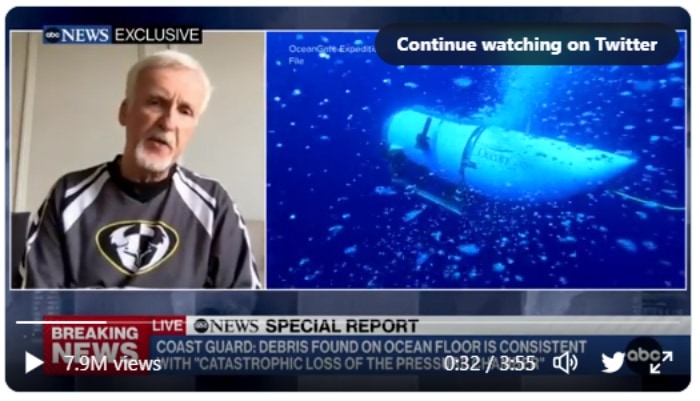James Cameron, Oscar-winning director of the blockbuster Titanic and an extremely experienced diver himself, says the Titan-submarine exploded underwater last week because it was not made of the correct material.
The underwater craft disappeared without a trace on Sunday after it went on a dive to the wreck of the Titanic started On board were five people: British billionaire Hamish Harding, wealthy Pakistani-British citizens Shahzada Dawood and his son, Suleman, as well as OceanGate’s CEO, Stockton Rush, and a French submarine operator, Paul Henri-Nargeolet, also known as “Mr. Titanic” because of his frequent dives at the wreck.
The rig was searched for days, until an underwater robot on Thursday found the wreckage of the Titan close to that of the Titanic came down
Rear Admiral John Mauger said the Coast Guard could not be sure when or why the vessel exploded, while OceanGate said the passengers died in what was believed to be a “catastrophic explosion” of the vessel’s pressure hull.
Cameron, who is considered a leading expert on diving and underwater vehicles, made his comments about the reason for the explosion in interviews with ABC News and The New York Times made.
“I have been there several times. I know the (titanic-)wreck site very good. I did 33 dives and calculated that I had spent more time on the ship than the captain did at the time.”
Cameron says that as a designer of underwater vehicles, he himself designed and built a submarine to go to the deepest parts of the ocean – three times deeper than the level at which the Titanic lie. “I understand the engineering problems associated with building this kind of rig and the safety protocol you have to go through.”
According to him, there had never before been any deaths on this kind of underwater expedition and the Titan exploded because it was made of carbon fiber. It is stronger and lighter than steel or aluminum, but has much less strength under great pressure.
‘Titanic’ director James Cameron on the ‘catastrophic implosion’ of Titan submersible: “I’m struck by the similarity of the Titanic disaster itself, where the captain was repeatedly warned about ice ahead of his ship and yet he steamed at full speed into an ice field.” pic.twitter.com/vO8JkCXS5f
— ABC News (@ABC) June 22, 2023
The implosion – when an object explodes inwards – would have been an extremely violent moment, says Cameron; nearly equivalent to ten cases of dynamite exploding.
He also said in the interviews that such deep dives are a fine art and that all submarines “except this one” undergo a specific and comprehensive certification protocol to ensure they are safe for passengers.
According to him, before the expedition there were already deep concerns about the safety of the Titan. There were even letters to the company warning OceanGate that their work and vessel was too experimental to carry passengers and that it needed to be certified.
“I am struck by the similarities with the titanic-disaster where the captain was repeatedly warned about the ice in front of his ship. Yet on a moonless night he steamed full speed ahead into an ice field and many people died as a result,” says Cameron.
- Additional source: ABC News








